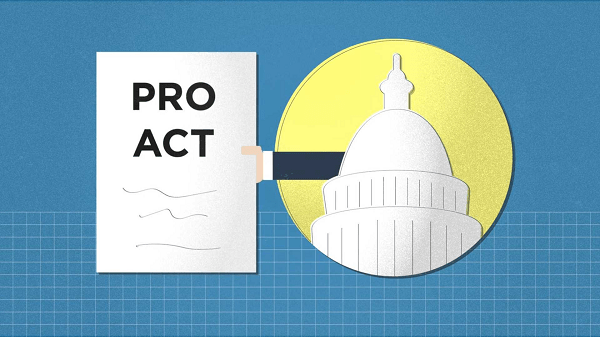
2.4.21 – National Law Review
As of 02/07/2021 text has not been received for H.R.842 – To amend the National Labor Relations Act, the Labor Management Relations Act, 1947, and the Labor-Management Reporting and Disclosure Act of 1959, and for other purposes. Download a Discussion Draft
The Protecting the Right to Organize Act (PRO Act) was originally passed by the House of Representatives in February 2020. With the Joe Biden administration now in office and power in both houses of Congress shifting towards the Democrats, the act has gained attention again. Indeed, Biden himself previously voiced support for the PRO Act.
If enacted, the PRO Act would arguably be the most significant piece of labor legislation since the National Labor Relations Act was passed in 1935. It would dramatically alter federal labor law by repealing much of the Taft-Hartley Act of 1947 amendments and codifying many pro-union provisions that would disadvantage companies.
Here are some significant provisions of the PRO Act:
- Legislatively codify the Obama Board decisions in Browning-Ferris Industries (which relaxed the joint-employer rule), Specialty Healthcare (which made it easier for unions to establish bargaining units and “micro units”), and Purple Communications (which allows the use of workplace email for organizing purposes)
- Reverse the Supreme Court’s decision in Epic Systems v. Lewis – this decision held that agreements mandating individual arbitration are enforceable
- Prohibit mandatory arbitration agreements in employment contracts
- Require interest arbitration if the union and employer cannot agree on a collective bargaining agreement.
- Codify California’s “ABC test” – imposes stricter requirements for employers to classify a worker as an independent contractor versus an employee
- Codify “ambush election rules” – shortens the amount of time between filing for a petition for election and the actual election
- Codify the 2016 “persuader regulation” – requires labor attorneys and firms to disclose significant facts about their relationships with employers
- Ban Right-to-Work laws – these laws prohibit employers and unions from requiring joining a union or paying fees as a condition of employment
- Institute a “stealth” card check – allows unions to challenge election results and get certified automatically in certain circumstances
- Provide a private cause of action for unfair labor practices outside of the National Labor Relations Board’s jurisdiction
- Introduce new civil penalties for labor law violations, including personal liability
- Codify the NLRB’s “notice posting” requirement – requires employers to post a notice informing employees of their rights under the NLRA
- Authorize secondary boycotts – allows unions to target any company through picketing and protests, even those unrelated to a labor dispute
- Ban employers from permanently replacing strikers
The legislation would be a significant re-write of labor law, but whether it will pass Congress still remains a question. Democrats have control of both houses, but in 2009, a Democrat-controlled Congress fell short in a similar attempt at a labor law reform by failing to pass the Employee Free Choice Act. Regardless, changes at the NLRB seem to already be underway, as President Biden recently fired the NLRB’s general counsel Peter Robb and appointed Democrat Lauren McFerran to the Board to serve as chair. Employers can expect more pro-union changes under the Biden administration on the horizon.
So, should you be concerned about the PRO Act? Yes. Whether you are a unionized or non-union organization, there are many provisions within the act that would decrease your management flexibility on a number of fronts. This will be a critical issue to monitor in the coming months and years.
